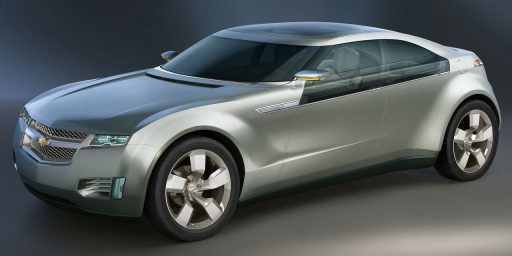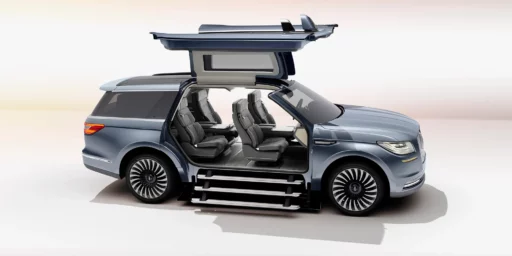Experimental Hybrid Cars Get Up to 250 MPG
Modified versions of the existing Toyota Prius hybrid get up to 250 miles per gallon.
Experimental Hybrid Cars Get Up to 250 Mpg (AP)
Politicians and automakers say a car that can both reduce greenhouse gases and free America from its reliance on foreign oil is years or even decades away. Ron Gremban says such a car is parked in his garage. It looks like a typical Toyota Prius hybrid, but in the trunk sits an 80-miles-per-gallon secret — a stack of 18 brick-sized batteries that boosts the car’s high mileage with an extra electrical charge so it can burn even less fuel.
Gremban, an electrical engineer and committed environmentalist, spent several months and $3,000 tinkering with his car. Like all hybrids, his Prius increases fuel efficiency by harnessing small amounts of electricity generated during braking and coasting. The extra batteries let him store extra power by plugging the car into a wall outlet at his home in this San Francisco suburb — all for about a quarter.
He’s part of a small but growing movement. “Plug-in” hybrids aren’t yet cost-efficient, but some of the dozen known experimental models have gotten up to 250 mpg. They have support not only from environmentalists but also from conservative foreign policy hawks who insist Americans fuel terrorism through their gas guzzling.
And while the technology has existed for three decades, automakers are beginning to take notice, too. So far, DaimlerChrysler AG is the only company that has committed to building its own plug-in hybrids, quietly pledging to make up to 40 vans for U.S. companies. But Toyota Motor Corp. officials who initially frowned on people altering their cars now say they may be able to learn from them. “They’re like the hot rodders of yesterday who did everything to soup up their cars. It was all about horsepower and bling-bling, lots of chrome and accessories,” said Cindy Knight, a Toyota spokeswoman. “Maybe the hot rodders of tomorrow are the people who want to get in there and see what they can do about increasing fuel economy.”
The extra batteries let Gremban drive for 20 miles with a 50-50 mix of gas and electricity. Even after the car runs out of power from the batteries and switches to the standard hybrid mode, it gets the typical Prius fuel efficiency of around 45 mpg. As long as Gremban doesn’t drive too far in a day, he says, he gets 80 mpg. “The value of plug-in hybrids is they can dramatically reduce gasoline usage for the first few miles every day,” Gremban said. “The average for people’s usage of a car is somewhere around 30 to 40 miles per day. During that kind of driving, the plug-in hybrid can make a dramatic difference.”
This is hardly a practical solution for a family vacation but would meet the needs of most commuters. One suspects that continued high prices for gasoline would make mass marketing Gremban’s technology economically feasible.






No, he’s not getting 250 MPG. Somewhere he is paying to charge those batteries. That energy has to be counted.
I’ve been designing electical/mechanical/deisel systems for sailboats for over 10 years as something of a hobby and have been cruising my own boat in Mexico for 7 years.
He’s lucky he lives in my hometown of San Francisco because without running the engine or without a huge battery bank and large inverter there’s no way he has air-conditioning. Ain’t gonna sell.
James,
Sadly this artice paints a completly innacurate picture. Check my trackback.
I am sure not going to get excited about any car getting good mileage. Before any vehicle gets into production, the oil companies will do all they can to keep their “Cash Cow” going including paying off politicians to out and out skulduggery to see such a vehicle is not offered to the public.
And, The vehicle manufacturers will make sure they take a lesson from the FDA on how to delay production.
I will tell you one fact:
Auto producers will not produce any auto unless it reduces their present production costs.
James,
You’re correct in saying this won’t work for the family vacation. So are we now required to buy and maintain two seperate vehicle types? One of the reasons SUV’s and for that matter, mini-vans, are fairly popular is because of their flexability.
Personally, when they can come up with something that will tow 6000 lbs, for 700-plus miles per day, without a safety issue, as my current vehicle does, and yet will haul me back and forth to my job sites, I’ll admit they’ve got something. A plug-in doesn’t cut it.
Herb: I have been hearing goofy stories about “sinister oil companies”, and 100 mile per gallon carburetor stories for sixty years. They were hokum sixty years ago and they are hokum now.
BTW: Twenty five cents buys about 2 horsepower hours of electricity. How are you going to drive at 40 miles per hour for one-half hour (20 miles) with only 2 horsepower? Or: How much of an assist can 2 horsepower give you?
Bithead: The physics of it all say that we may be wise to have two vehicles. A smaller hybrid to commute with, and shop with, and a larger hybrid for the family car. Expensive gasoline makes for cheaper hybrids. Hybrids offer almost no advantage on long highway trips, but long highway trips are the exception and maybe we can’t buy for the exception anymore.
IN my own case, it’s hardly the exception.
I put about 30,000 OTR miles on my van per year.
Bithead: Sorry, I wasn’t clear that I was thinking about family, or personal transportation. I don’t think there is much hope for RV’s or vans or trucks until hydrogen comes along. Propane and natural gas track gasoline in cost, so there is not much hope there for cost savings in heavy local hauling. Hybrids for semi’s isn’t going to happen, is it? Hydrogen for semi’s would be great with V-12s.
IF it worked, what would it run on? Electricity. And how do we get more than half the electricity in the United States? By tearing down mountains to get the coal.
Nuclear powered generators would work. I suppose more efficient solar will come along, and that will help. All of this stuff is 10-20 years away at best.
RJN:
I have heard the same stories also.
But, the oil companies are reaping tremendous profits with the oil prices so high. I hope for one minute you don’t think that the oil companies are not controlling the price of oil.
And, I hope that you don’t think that the almighty dollar is not manipulated by those who stand to make even more money.
The oil companies don’t care one bit about you and I, they only think about money and that alone is what high oil prices is all about.
If you think differently, then you are foolish.
Right, Herb. The oil companies are going to make more money by jacking up prices until the airlines go bankrupt, bread costs $15 a loaf, and people’s idea of a luxury vacation is to walk to the city swimming pool instead of driving to the beach.
Say it with me: You don’t make more money by selling less product.
What’s going on here is massive new demand in developing countries. Period.
Bwahahahahaha.
Just keep in mind, according to an Atlantic Monthly article last year, for every $1 gain in the price of a barrel of crude, the Saudis get an additional $3 billion a month. Just think of how many Wahhabi mosques that funds around the world! And crude is up what, 40% this year? Awesome, makes me want to vomit every time I fill up my car. Personally, I’ve been riding my bike a lot more recently.
Don’t you just love the Nay-sayers and the “not invented here” crowd. And “It never existed before, how could it possibly exist now.” bunch of lame brains. Don’t waste your time arguing why todays technolgy won’t help the guy that is hauling 10000 pounds of concrete to his work place every day, just wave to them as you pass them at the gas pumps. 🙂